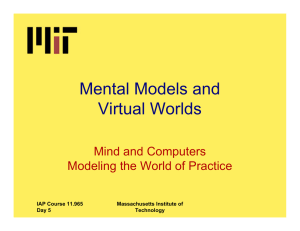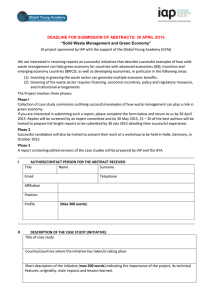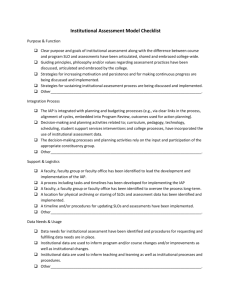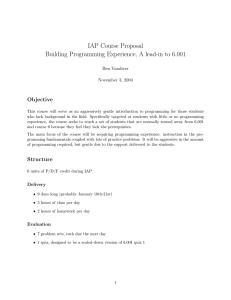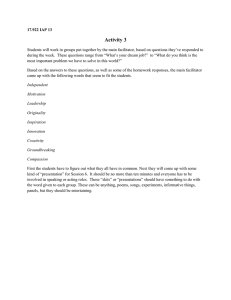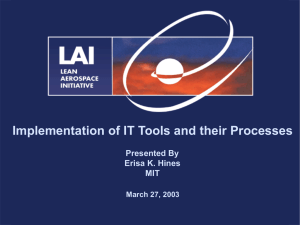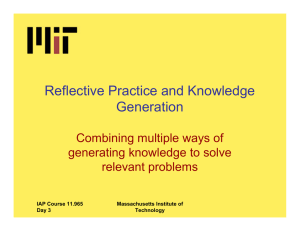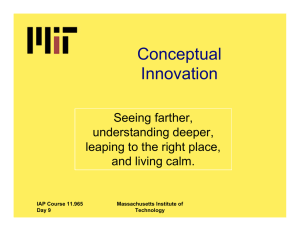Analyzing Frames The Art of Discovering Underlying and
advertisement
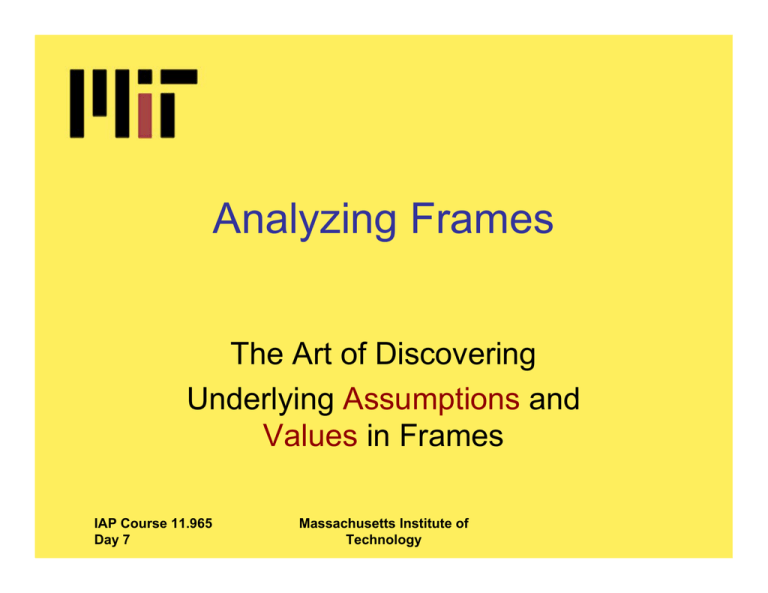
Analyzing Frames The Art of Discovering Underlying Assumptions and Values in Frames IAP Course 11.965 Day 7 Massachusetts Institute of Technology Naming and Framing the Energy Problem • Unreliable Sources, Reduce Our Dependence On Foreign Energy • Emissions Warning, Get Out of the FossilFuel Predicament • Curb Our Appetite, Reduce Our Demand for Energy Source: National Issues Forum, The Energy Problem, http://www.nifi.org IAP Course 11.965 Day 7 Massachusetts Institute of Technology Assumptions • Assumptions are beliefs about the world – X thousand people use Open Courseware each year. – Democracy improves the quality of life. • The first type of assumption is situational • The second type of assumption is theoretical • If a belief is tacit in our thinking we name it “assumption”, once it is made explicit it becomes a “hypothesis”. IAP Course 11.965 Day 7 Massachusetts Institute of Technology What Are Values? • Values are criteria that we use for deciding if a situation is desirable or undesirable, or if an idea is a good one or a bad one: – being secure or insecure (security) – being treated fairly or unfairly (justice) • Every time we frame or evaluate situations we apply values. Frequently values are tacit. • In the example “Emissions Warning, Get Out of the Fossil-Fuel Predicament” “the protection of the environment” is a value. • In the example “Unreliable Sources, Reduce Our Dependence On Foreign Energy” “energetic independence is a value”. IAP Course 11.965 Day 7 Massachusetts Institute of Technology Frames, Assumptions and the Thinking Box • Every time we frame a situation we base elements of our frame in beliefs about the world; but we are not aware of them. • The discovery of assumptions is easier when we are “out of the box”, but the box is invisible for us. • People who disagree with our frames are more acute for identifying our assumptions. • The discovering of assumptions is a kind of reverse engineering that disturb our beliefs. IAP Course 11.965 Day 7 Massachusetts Institute of Technology Discovering Assumptions • Assumptions are beliefs that are behind the causal relations of our frames • If “assumption A”, then “B” generates “C” • A possibility for discovering assumptions is to go through the components and the causal relations of the frame asking “why” they are stated in that particular way. • The assumptions should be falsifiable. It means that it should be possible to get information for verifying if an assumption is real or not. IAP Course 11.965 Day 7 Massachusetts Institute of Technology Exploring Assumptions W hy ? Why? Problem Future Scenario • If a situation is framed as a problem generated by a group of factors and a scenario that is resulted from the problem, then the exploration of assumptions may go back through the causal relations of the frame. IAP Course 11.965 Day 7 Massachusetts Institute of Technology Questions for Exploring Assumptions • Why the scenario, or one component of it, is generated by the problem or a component of it? • Why the factor A contributes to the problem? • Which conditions are required for the work of causal relations? IAP Course 11.965 Day 7 Massachusetts Institute of Technology Questions for Exploring Values • Why do you think it is a problem? • Which values are threatened by the problem or by the scenario? • Which motivations are behind the way the situation were framed? IAP Course 11.965 Day 7 Massachusetts Institute of Technology
